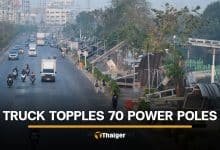Illegal gambling activity leads to forced power cut in Shwe Kokko

Those living in Thailand, depending on the town and province, may be well accustomed to power outages for various reasons. With older-style power grids and connections, some areas buckle under a load of increased usage or simply have failures more often due to older, failing infrastructure. But the news of power cuts in Skwe Kokko is different, and for people in the Myanmar Thai-bordered town, the outages are another indication that all is not well between the zone and the larger Myanmar government.
About Shew Kokko
Shwe Kokko is a notorious hub of unlawful activities, including human and drug trafficking, cybercrime and even illegal online gambling, where users are enticed to play in an attempt to win real money with no deposit bonus codes.
It’s a town in the Karen State, which shares a border with the Tak province in Thailand and shares a shaky recent history. Known to many as Yatai New City, Shwe Kokko is a place where Chinese wild-west-style new-wave fintech proponents have flocked to, under the guise of building a special economic zone.
The township is being significantly emboldened through the partnerships of a few key figureheads. This includes the Yatai International Holding Group Limited, Saw Chit Thu, a powerful Karen military officer who runs the area and is known for clashes with the larger Myanmar government, and She Zhijiang, a famous Chinese online gambling kingpin with a Cambodian passport. In Cambodia, She’s name is Tang Kriang Kai, and it is theorized that he was able to obtain a passport through donating $250,000 to the Cambodian government, a legal process within the country.
Thanks to a crumbling offshore-serving casino segment in Cambodia, particularly to the Chinese people, the new city in Myanmar was deemed to be an ideal location for a new smart city. Powered by blockchain, gambling, and Chinese workers, the city is operating outside of the bounds of what has been approved by the Myanmar government.
When construction of Yatai New City began in 2017, it was marketed as a rosy Myanmar-China approved project. But this is not the case. As tensions build between the city leaders and the Myanmar government, with shady money changing hands, military conflict, and illegal gambling operations and crypto operations flourishing.
A power cut that’s more about power than electricity
In Skwe Kokko New City, electricity is sold to the city by the Thailand Provincial Electricity Authority, not an electricity provider of Myanmar. The electricity is piped across the border to the people of Skwe Kokko to power their operations and daily activities.
However, at the start of June 2023, the contract for providing electricity to the city expired, and so it was up to the company to decide whether to continue the selling relationship. Thanks to pressure from the Myanmar military, the company decided not to continue to provide power to the city.
While the city grew from online gambling activities, it has apparently attracted the manufacture of online Chinese scamming techniques, driven by people lured to the city with promises of good jobs only to find themselves caught up in a seedy industry.
As the city grew and gained attention internationally, the Chinese also began to watch. And like the gambling operations in both Cambodia and Thailand, became concerned with what was going on abroad. After meetings in Myanmar, the Chinese foreign minister put pressure on the government to do more in Skwe Kokko to reign in the rampant goings-on.
What happens next?
The region has a backup electricity supply, although a longer-term solution isn’t known to be apparent. As in many cases, it may end up being that money talks. However, if this isn’t enough to sweeten the deal, the Karen Border Guard Force, which runs the city, may need to make some concessions to Myanmar as a whole and operate more in the terms of what is allowed in the wider government.
As Myanmar as a country struggles with internal conflicts, it can detract from power plays by people from other regions, such as what has happened with this new Chinese city. It seems to be a similar story to what we saw playing out in Sihanoukville in Cambodia.
First comes an injection of money from outside sources, under a clean-cut image of revenue-generating legal gambling activities and new technology. But then, due to a lack of rules under these new investments comes a move into more illegal activities, and further money, which then attracts the attention of the Chinese government. Eventually, something has got to give. We will wait to see how the situation in Skwe Kokko plays out.
Latest Thailand News
Follow The Thaiger on Google News:


























